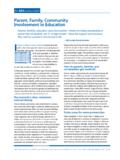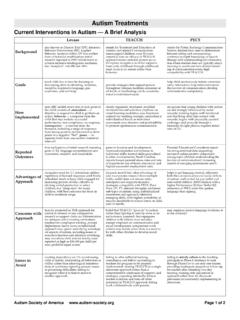Transcription of OVERCOMING SCHOOL FAILURE: POLICIES THAT WORK …
1 OVERCOMING SCHOOL failure : POLICIES that WORK. OECD PROJECT DESCRIPTION. APRIL 2010. EXECUTIVE SUMMARY. SCHOOL failure penalises a child for life. The child who leaves SCHOOL without qualifications faces weaker job prospects, lower income throughout working life and a smaller pension in retirement. The same child is also less likely to take up further learning opportunities and less able to participate on an equal basis in the civic and social aspects of modern society. Educational failure imposes very high costs to society. It limits the capacity for our economies to produce, grow and innovate, damages social cohesion and imposes additional costs on public budgets to deal with the consequences of SCHOOL failure increased criminality, higher public health spending, public assistance, etc.
2 Reducing education and SCHOOL failure is a high priority in education policy agendas. Education and skills are increasingly valued in society, while the economic pressures generated by globalisation and increased migration pose important challenges to social cohesion. These trends increase the economic and social rationale for OVERCOMING SCHOOL failure . The current economic crisis adds urgency to the task with greater unemployment and a shift in the demand for skills. More families have become economically vulnerable and are unable to meet the costs of education.
3 Yet, while most education ministries highlight the reduction of SCHOOL failure as a priority, and evidence increasingly shows that POLICIES do have an impact, challenges remain on what POLICIES to implement, and how to implement them. The OECD can promote POLICIES to overcome SCHOOL failure . The OECD project OVERCOMING SCHOOL failure : POLICIES that Work provides evidence on the POLICIES that are effective to reduce SCHOOL failure , and proactively supports countries in promoting reform. The project builds on the conceptual framework developed in the OECD s No More Failures: Ten Steps to Equity in Education (2007).
4 SCHOOL failure can be seen as twofold. Firstly, OVERCOMING SCHOOL failure implies ensuring a basic minimum standard education for each and every student (inclusion). Secondly, since not all individuals are equal, reducing SCHOOL failure in a targeted way allows strengthening equality of opportunities (fairness). This project is organized to make the most of the OECD s strengths to provide a framework through which governments can compare experiences, seek responses to tackle common problems, and identify and share good practices. The project has two complementary strands of work designed to ensure both comparative analysis of POLICIES that are successful in reducing education failure and national analysis and support towards action that different OECD and partner countries might carry out.
5 Comparative analysis: This strand of the project will develop comparative analysis on the policy levers which can contribute to overcome SCHOOL failure in schools and reduce inequities. It is based on participating country short background reports, data analysis, research and literature reviews, and will update the evidence, findings and implementation challenges presented in No more failures: Ten Steps to Equity in Education. National assessment seminars: This strand is designed to support countries in the analysis and implementation of their particular challenges to OVERCOMING SCHOOL failure .
6 National assessment seminars to raise awareness and support national discussion will combine international expertise and national dialogue to examine the situation in the host country, drawing on tools and expertise from the OECD. As a result of each National Assessment Seminar, the OECD will develop a Note on Progress in Reducing SCHOOL failure . 1. TABLE OF CONTENTS. EXECUTIVE SUMMARY .. 0. 1. INTRODUCTION .. 3. 2. background .. 5. 3. PROJECT DESCRIPTION .. 7. 4. CONCEPTUAL FRAMEWORK AND KEY ISSUES .. 9. 5. PROJECT OUTPUTS .. 23. 6. PARTICIPATING COUNTRIES ROLE AND 27.
7 7. PROJECT CALENDAR .. 29. 8. RESOURCE IMPLICATION OF THE PROJECT .. 29. BIBLIOGRAPHY .. 30. Figures Figure 1. How social background affects performance in 11. Figure 2. How many students struggle with reading? .. 12. Figure 3. How do migrant students perform at SCHOOL ? .. 13. Figure 4. How many students did not obtain an upper secondary education? .. 18. Figure 5. Structure of the OECD Project OVERCOMING SCHOOL failure : POLICIES that Work .. 23. Boxes Box 1. The Ten Steps to Equity in Education .. 7. Box 2. How to define SCHOOL failure and equity? .. 9.
8 2. 1. INTRODUCTION. 1. Education is fundamental in determining a child s adult life: indeed education is not only associated with higher income, but also with better health, and even longer life for individuals. For societies, education has been demonstrated to also contribute considerably to economic growth. Education has expanded considerably in the past fifty years. Nevertheless, even if more and more students finish SCHOOL and enter tertiary education, many children are still left behind and exit the education systems without the skills that they will need for their adult life, representing a true handicap in terms of employment and life chances.
9 Across OECD countries, nearly one out of three adults have only primary or lower secondary education. 2. SCHOOL failure can be defined as when a SCHOOL system fails to provide services leading to successful student learning, or when a student is failing to advance to the next grade, and eventually becomes a dropout, both aspects being intrinsically linked (Psacharopoulos, 2007). All OECD member countries face the problem of SCHOOL failure and dropout, its most visible manifestation: students who exit the SCHOOL system before finishing secondary SCHOOL or with lower quality qualifications, resulting in high costs not only for them, but for the society and the country as a whole.
10 This phenomenon can be caused by a multitude of different factors: student-based, such as learning difficulties, heterogeneous educational needs; socio-cultural, related to students family and socio-economic background and institutional: SCHOOL - based, such as inadequate resources, incoherent curriculum, inappropriate teaching methods. 3. The social and economic costs of SCHOOL failure are extremely high, and take many different forms: increased criminality, lower rates of economic growth, lower intergenerational effects on children and parents, higher public health spending, higher unemployment, lower social cohesion (Psacharopoulos, 2007), and even lower participation in civic and political activities.

















